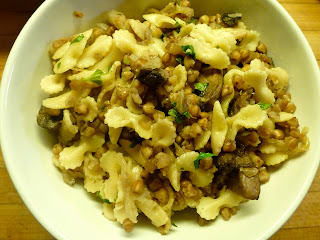this month at pst:
musician, philosopher and author David Rothenberg presented ideas on the
purpose, or lack thereof, of beauty in Nature. Why, he wonders, beyond Darwin's
theories on sexual attraction do bowerbirds make
such elaborately 'artistic' nests and more importantly, how, through our own
art practices can we create a dialogue that includes Nature?
It seemed logical to approach the food through
the vast subjective lens of beauty. I imagined the
table groaning under heaping platters of ornately garnished, brightly
colored smorgasbord, each open-faced selection evoking the
beauty of feathers, fishes and petals (although I suppose this is
mimicry rather than dialogue.) Next I imagined casseroles of molten
caramelized cheesy things, BBQ burnt ends, and slathered buttercream (ahh, excess! Hardly beautiful yet
so appealing.) Then one evening gainfully forming Simona's Sardinian gnocchetti it struck me pasta
was a perfect illustration for David's talk. There are hundreds of shapes and
while certain architecture better holds sauce or stands up to baking over boiling, the primary evolutionary reason for all these shapes is pure
ingenious fancy.
 |
| cavatelli with pesto |
 |
| pappardelle with Bolognese |
 |
| kasha varniskas with sauteed mushrooms |
By my aesthetics not one of these dishes is
beautiful though all were delicious and each added to the conceptual
illustration of the point. I countered their aesthetic lack with a root
vegetable salad whose beautiful colors glorified nature, though the roots were
not, as the pasta was, art.
 |
| carrots, white and green daikon, watermelon radishes, golden and chiogga beets... this snapshot does no justice! |
On either side of these selections I served bread, which has a million shapes and ingredient nuances, and cookies, which has a zillion more. Both the menu and the pst talk grappled but did not resolve fundamental questions. Is natural beauty and handmade beauty apples and oranges? Is deliciousness beautiful? And what has this to do with art? (Maybe the art of a dish comes from thoughtful arrangement and maybe art’s relation to beauty is only tangential.)
Most often beauty is akin to sight, sound
and ideas, (senses centered in the head.) Less often beauty is related to taste and touch (the
body.) We seldom say something feels beautiful on our skin, though we might
say it feels delicious. Nor do we describe a complex flavor as tasting
beautiful, though we would say freshly harvested dew-drenched fraises des bois
are exquisite.
My friend Simona recently posted an article in
which she discussed the relationship of "suchness" a word that
describes a Zen ideal of essence or true nature, and food. She was commenting
on the beauty of ‘pure’ and ‘natural’ flavors, how you can taste something and
find its richness more clearly when it is uncluttered, unfettered, unadorned. I
on the other hand find ‘the complex’ and ‘the relational’ (and maybe when it come to food- ‘the fat’) more richly engaging. I find beauty in surrounding narratives rather than in things.
Contemporary high-end food
with its dishes of foraged lichens and sonicated emulsions creates an aesthetic
that confuses my thoughts. (BTW- notice how
fancy restaurants like high-culture museums primarily features the work of
white men.) Though I’ve yet to eat in one
of these Temples of Haute ($$$) Cuisine
I’ve sampled examples at seminars and workshops. From these tastes and by
looking at many beautifully photographed dishes I find myself impressed by
their intricacy but seldom is my appetite whetted.
 |
| Sweetbreads, truffles, and wild mushrooms by Chef David Toutain from a recent dinner at Atera. The photo was snapped by Anne Engammare McBride and I snitched it from her facebook page. |
On the other hand this homely pot of Bolognese excites my appetite and engages my imagination as I think of stories from home kitchens. The image as is the sauce is far from beautiful and yet to my stomach it is.

In reading the post again and in particular, in looking again at the two last photos (such a felicitous juxtaposition!), I think the discussion of how the two dishes engage us is quite interesting. The Bolognese sauce is what it is: it declares itself by look, smell and flavor. The other dish confuses, impresses, but fails to communicate at a more intimate level.
ReplyDelete